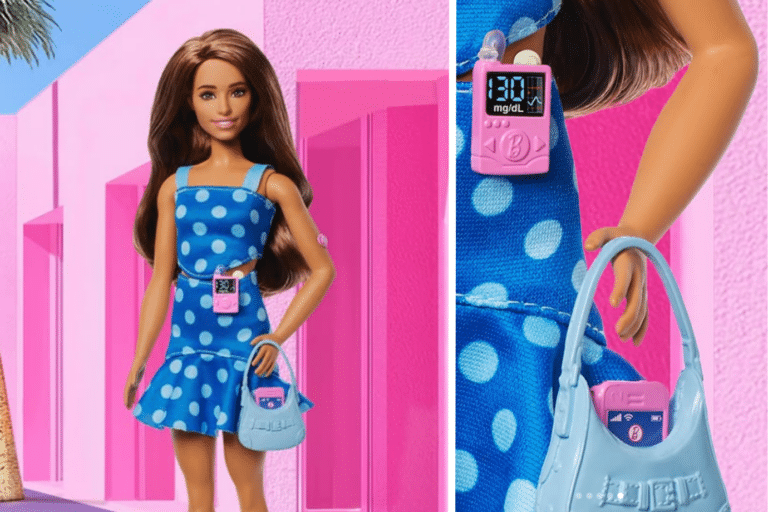When I was 12, I was called a junkie in the school playground.
I had just been diagnosed with Type 1 Diabetes. I was injecting insulin during lunch when another student pointed and asked if I was on drugs. The nickname stuck.
That was my welcome to chronic illness.
Last week, more than two decades later, I saw something I never thought I would: a Barbie doll with a CGM (continuous glucose monitor) and insulin pump.
For women like me, it was a big deal. Growing up, there were no public figures, no magazine covers, no characters in books or on TV who looked like me – someone managing a serious, invisible health condition day in, day out. Seeing Barbie with a chronic illness felt like progress.
And then I read the comments.
“Will she lose her legs?”
“Hope they made a blind version too.”
“Does she come with an amputation kit?”
These weren’t one-offs. They were everywhere. Some were said as “jokes.” Others came from people parroting tired, outdated stereotypes about what diabetes is, who gets it, and what it means.
This is the reality people with chronic illness live with – especially in the workplace. It’s not always direct bullying. Often, it’s subtle: a hesitation before offering you a promotion. A raised eyebrow at your time off for medical appointments. A casual comment about sugar at a morning tea. Or the assumption that you’re “not really sick” if you’re still working.
This is why representation without education doesn’t go far enough.
Don’t get me wrong – I celebrate the visibility. For a young girl newly diagnosed with Type 1 Diabetes, seeing Barbie with medical tech normalises what can be an incredibly isolating experience. But visibility alone doesn’t dismantle stigma. In fact, when not paired with understanding, it can actually expose just how deep that stigma runs.
Chronic illness doesn’t fit the feel-good narrative
We love stories of resilience. Of people “overcoming” illness. We are far less comfortable with the idea that many people live with conditions that don’t get cured. They’re managed. They fluctuate. They impact energy, attention, and physical capacity. And most importantly – they don’t look the way people expect them to.
This misunderstanding can be dangerous. Research by Diabetes Australia has found that over 80% of people with diabetes have experienced some form of stigma, and nearly 1 in 5 have withheld the fact they have the condition at work due to fear of judgement or discrimination.
This isn’t just a personal problem – it’s a workplace problem. And an economic one.
We lose talented people – especially women – from the workforce every day because they don’t feel safe, supported, or understood. Not because of their health condition itself, but because of the assumptions made about it.
What does real inclusion look like?
As a coach and inclusion consultant for people with chronic illness and disability, I work with individuals and organisations to close this gap. Real inclusion doesn’t mean having an EAP flyer on the lunchroom fridge or posting a Diabetes Week graphic on LinkedIn.
It means:
- Educating managers about fluctuating health conditions and what flexibility really means
- Building psychologically safe cultures where staff don’t have to “prove” their illness
- Designing jobs that are performance-based, not presenteeism-based
- Understanding that disability and chronic illness aren’t interchangeable – and both deserve inclusion
And yes, it means challenging the deeply internalised biases many people hold – the ones that surfaced so clearly under Mattel’s Instagram post.
Representation opens the door. But if we walk through that door and are still met with ignorance, suspicion, or judgement, then it’s just tokenism dressed up in plastic.
To every woman managing a chronic illness in silence
I see you. I’ve sat in meetings while my blood sugar crashed. I’ve worked through fatigue that made my vision blur. I’ve taken calls from hospital beds and read passive-aggressive emails about missed deadlines while waiting for blood tests. And I know I’m not alone.
You shouldn’t have to trade your health for your ambition. You shouldn’t be made to feel like a burden for needing flexibility. And you definitely shouldn’t be reduced to a joke.
This Diabetes Week, Barbie gave us a glimpse of the future. The internet reminded us why we still have so much work to do.
Become a Women’s Agenda Foundation member and support our work! We are 100% independent and women-owned. Every day, we cover the news from a women’s perspective, advocating for women’s safety, economic security, health and opportunities. Foundation memberships are currently just $5 a month.
Bonus: you’ll receive our weekly editor’s wrap of the key stories to know every Saturday.


